Analysis of Legislation and Ethics in Travel and Tourism Sector Report
VerifiedAdded on 2020/01/07
|13
|3791
|33
Report
AI Summary
This report provides a comprehensive analysis of legislation and ethics within the travel and tourism sector. It begins by outlining the legal and regulatory frameworks, including surface, sea, and air transport laws, emphasizing passenger safety and the responsibilities of tour companies. The report then evaluates the impact of health, safety, and security legislation, along with an analysis of the equality act, highlighting its significance in ensuring fair treatment for all. Further, it explains contract and consumer protection legislation, detailing customer rights and the importance of ethical considerations. Finally, the report examines ethical dilemmas faced by the sector, evaluating the role of Corporate Social Responsibility (CSR) policies in addressing these challenges and promoting sustainable practices. The report underscores the importance of adhering to legal and ethical standards to ensure both customer and employee well-being, contributing to the overall success of the tourism industry.
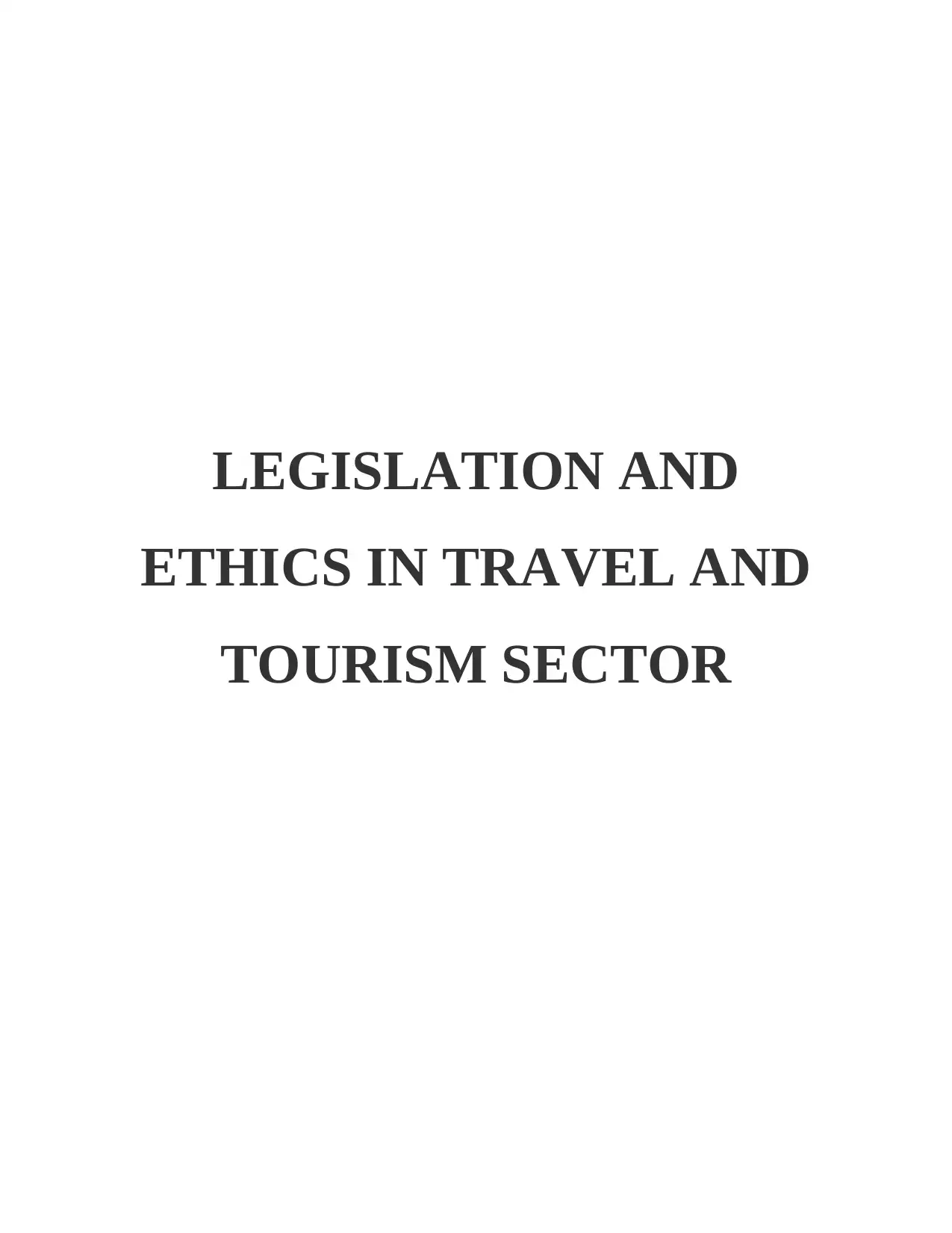
LEGISLATION AND
ETHICS IN TRAVEL AND
TOURISM SECTOR
ETHICS IN TRAVEL AND
TOURISM SECTOR
Paraphrase This Document
Need a fresh take? Get an instant paraphrase of this document with our AI Paraphraser
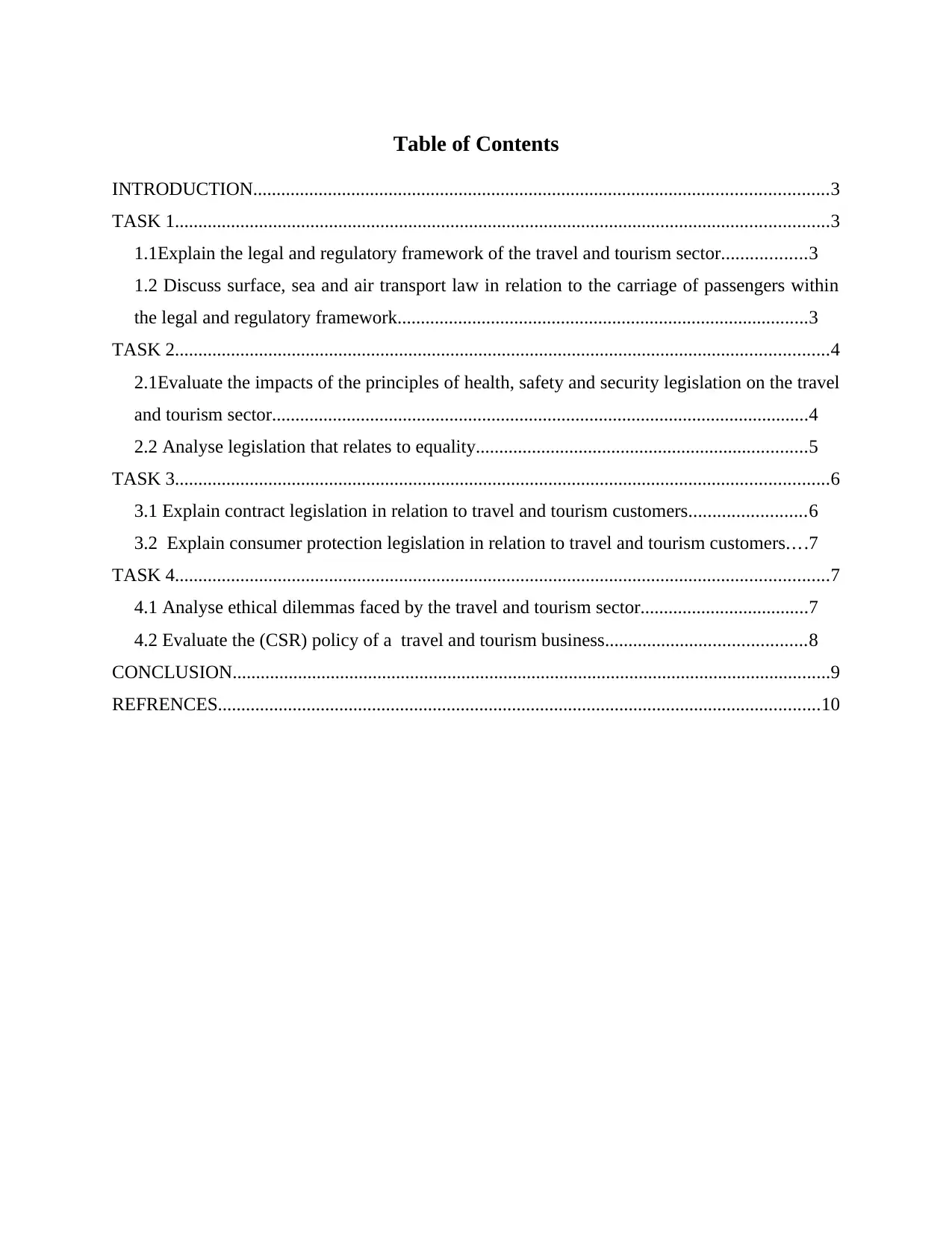
Table of Contents
INTRODUCTION...........................................................................................................................3
TASK 1............................................................................................................................................3
1.1Explain the legal and regulatory framework of the travel and tourism sector..................3
1.2 Discuss surface, sea and air transport law in relation to the carriage of passengers within
the legal and regulatory framework........................................................................................3
TASK 2............................................................................................................................................4
2.1Evaluate the impacts of the principles of health, safety and security legislation on the travel
and tourism sector...................................................................................................................4
2.2 Analyse legislation that relates to equality.......................................................................5
TASK 3............................................................................................................................................6
3.1 Explain contract legislation in relation to travel and tourism customers.........................6
3.2 Explain consumer protection legislation in relation to travel and tourism customers....7
TASK 4............................................................................................................................................7
4.1 Analyse ethical dilemmas faced by the travel and tourism sector....................................7
4.2 Evaluate the (CSR) policy of a travel and tourism business...........................................8
CONCLUSION................................................................................................................................9
REFRENCES.................................................................................................................................10
INTRODUCTION...........................................................................................................................3
TASK 1............................................................................................................................................3
1.1Explain the legal and regulatory framework of the travel and tourism sector..................3
1.2 Discuss surface, sea and air transport law in relation to the carriage of passengers within
the legal and regulatory framework........................................................................................3
TASK 2............................................................................................................................................4
2.1Evaluate the impacts of the principles of health, safety and security legislation on the travel
and tourism sector...................................................................................................................4
2.2 Analyse legislation that relates to equality.......................................................................5
TASK 3............................................................................................................................................6
3.1 Explain contract legislation in relation to travel and tourism customers.........................6
3.2 Explain consumer protection legislation in relation to travel and tourism customers....7
TASK 4............................................................................................................................................7
4.1 Analyse ethical dilemmas faced by the travel and tourism sector....................................7
4.2 Evaluate the (CSR) policy of a travel and tourism business...........................................8
CONCLUSION................................................................................................................................9
REFRENCES.................................................................................................................................10
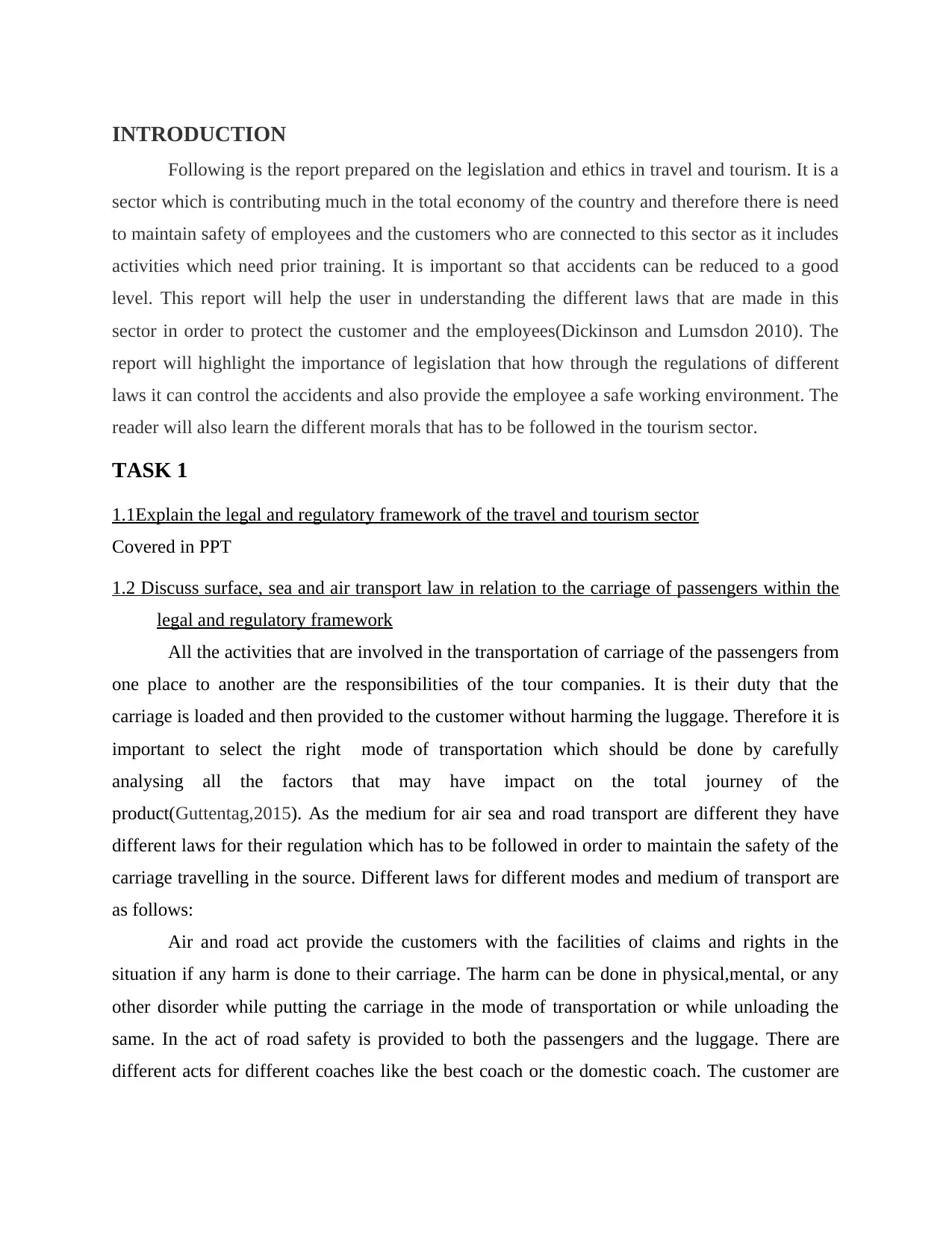
INTRODUCTION
Following is the report prepared on the legislation and ethics in travel and tourism. It is a
sector which is contributing much in the total economy of the country and therefore there is need
to maintain safety of employees and the customers who are connected to this sector as it includes
activities which need prior training. It is important so that accidents can be reduced to a good
level. This report will help the user in understanding the different laws that are made in this
sector in order to protect the customer and the employees(Dickinson and Lumsdon 2010). The
report will highlight the importance of legislation that how through the regulations of different
laws it can control the accidents and also provide the employee a safe working environment. The
reader will also learn the different morals that has to be followed in the tourism sector.
TASK 1
1.1Explain the legal and regulatory framework of the travel and tourism sector
Covered in PPT
1.2 Discuss surface, sea and air transport law in relation to the carriage of passengers within the
legal and regulatory framework
All the activities that are involved in the transportation of carriage of the passengers from
one place to another are the responsibilities of the tour companies. It is their duty that the
carriage is loaded and then provided to the customer without harming the luggage. Therefore it is
important to select the right mode of transportation which should be done by carefully
analysing all the factors that may have impact on the total journey of the
product(Guttentag,2015). As the medium for air sea and road transport are different they have
different laws for their regulation which has to be followed in order to maintain the safety of the
carriage travelling in the source. Different laws for different modes and medium of transport are
as follows:
Air and road act provide the customers with the facilities of claims and rights in the
situation if any harm is done to their carriage. The harm can be done in physical,mental, or any
other disorder while putting the carriage in the mode of transportation or while unloading the
same. In the act of road safety is provided to both the passengers and the luggage. There are
different acts for different coaches like the best coach or the domestic coach. The customer are
Following is the report prepared on the legislation and ethics in travel and tourism. It is a
sector which is contributing much in the total economy of the country and therefore there is need
to maintain safety of employees and the customers who are connected to this sector as it includes
activities which need prior training. It is important so that accidents can be reduced to a good
level. This report will help the user in understanding the different laws that are made in this
sector in order to protect the customer and the employees(Dickinson and Lumsdon 2010). The
report will highlight the importance of legislation that how through the regulations of different
laws it can control the accidents and also provide the employee a safe working environment. The
reader will also learn the different morals that has to be followed in the tourism sector.
TASK 1
1.1Explain the legal and regulatory framework of the travel and tourism sector
Covered in PPT
1.2 Discuss surface, sea and air transport law in relation to the carriage of passengers within the
legal and regulatory framework
All the activities that are involved in the transportation of carriage of the passengers from
one place to another are the responsibilities of the tour companies. It is their duty that the
carriage is loaded and then provided to the customer without harming the luggage. Therefore it is
important to select the right mode of transportation which should be done by carefully
analysing all the factors that may have impact on the total journey of the
product(Guttentag,2015). As the medium for air sea and road transport are different they have
different laws for their regulation which has to be followed in order to maintain the safety of the
carriage travelling in the source. Different laws for different modes and medium of transport are
as follows:
Air and road act provide the customers with the facilities of claims and rights in the
situation if any harm is done to their carriage. The harm can be done in physical,mental, or any
other disorder while putting the carriage in the mode of transportation or while unloading the
same. In the act of road safety is provided to both the passengers and the luggage. There are
different acts for different coaches like the best coach or the domestic coach. The customer are
⊘ This is a preview!⊘
Do you want full access?
Subscribe today to unlock all pages.

Trusted by 1+ million students worldwide
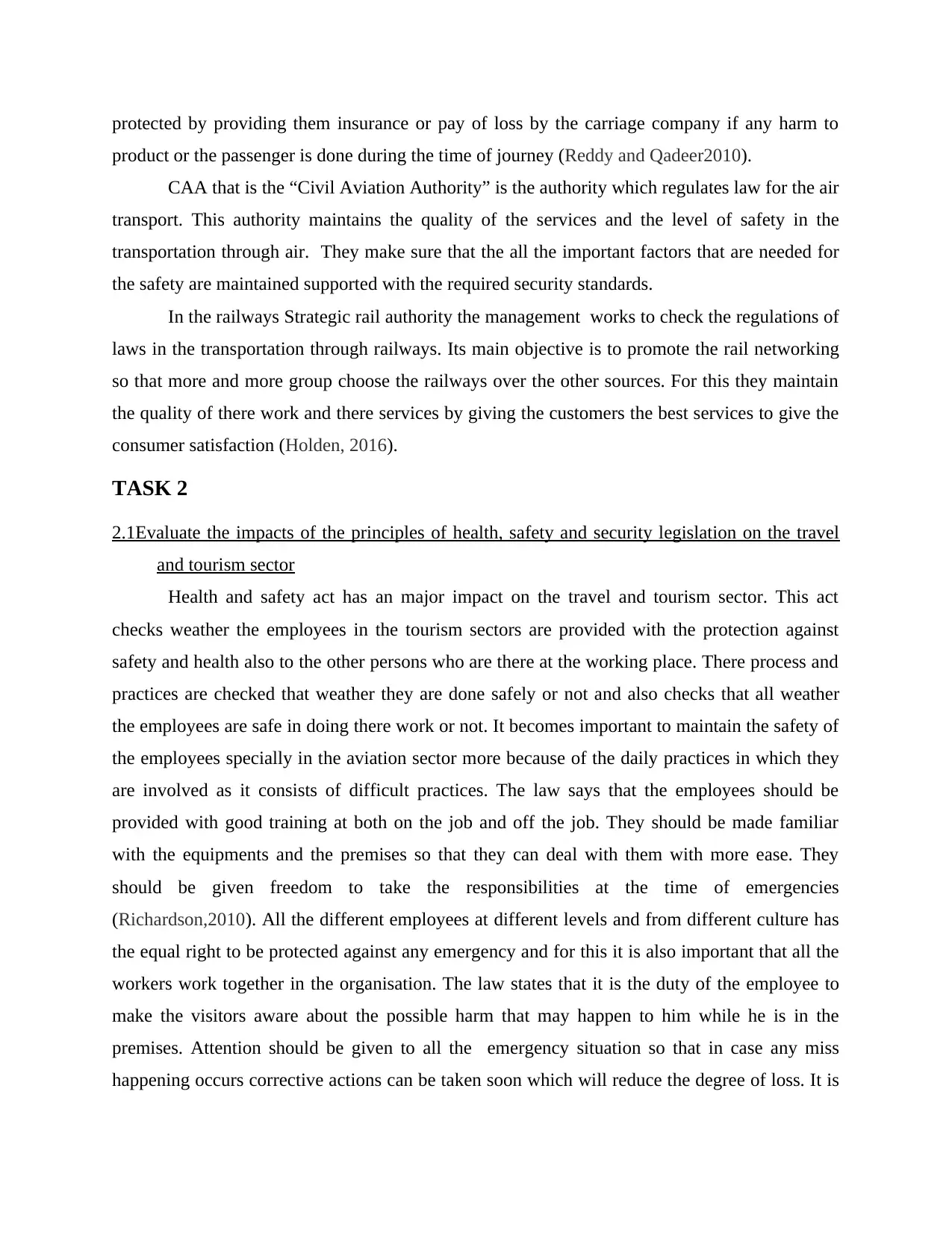
protected by providing them insurance or pay of loss by the carriage company if any harm to
product or the passenger is done during the time of journey (Reddy and Qadeer2010).
CAA that is the “Civil Aviation Authority” is the authority which regulates law for the air
transport. This authority maintains the quality of the services and the level of safety in the
transportation through air. They make sure that the all the important factors that are needed for
the safety are maintained supported with the required security standards.
In the railways Strategic rail authority the management works to check the regulations of
laws in the transportation through railways. Its main objective is to promote the rail networking
so that more and more group choose the railways over the other sources. For this they maintain
the quality of there work and there services by giving the customers the best services to give the
consumer satisfaction (Holden, 2016).
TASK 2
2.1Evaluate the impacts of the principles of health, safety and security legislation on the travel
and tourism sector
Health and safety act has an major impact on the travel and tourism sector. This act
checks weather the employees in the tourism sectors are provided with the protection against
safety and health also to the other persons who are there at the working place. There process and
practices are checked that weather they are done safely or not and also checks that all weather
the employees are safe in doing there work or not. It becomes important to maintain the safety of
the employees specially in the aviation sector more because of the daily practices in which they
are involved as it consists of difficult practices. The law says that the employees should be
provided with good training at both on the job and off the job. They should be made familiar
with the equipments and the premises so that they can deal with them with more ease. They
should be given freedom to take the responsibilities at the time of emergencies
(Richardson,2010). All the different employees at different levels and from different culture has
the equal right to be protected against any emergency and for this it is also important that all the
workers work together in the organisation. The law states that it is the duty of the employee to
make the visitors aware about the possible harm that may happen to him while he is in the
premises. Attention should be given to all the emergency situation so that in case any miss
happening occurs corrective actions can be taken soon which will reduce the degree of loss. It is
product or the passenger is done during the time of journey (Reddy and Qadeer2010).
CAA that is the “Civil Aviation Authority” is the authority which regulates law for the air
transport. This authority maintains the quality of the services and the level of safety in the
transportation through air. They make sure that the all the important factors that are needed for
the safety are maintained supported with the required security standards.
In the railways Strategic rail authority the management works to check the regulations of
laws in the transportation through railways. Its main objective is to promote the rail networking
so that more and more group choose the railways over the other sources. For this they maintain
the quality of there work and there services by giving the customers the best services to give the
consumer satisfaction (Holden, 2016).
TASK 2
2.1Evaluate the impacts of the principles of health, safety and security legislation on the travel
and tourism sector
Health and safety act has an major impact on the travel and tourism sector. This act
checks weather the employees in the tourism sectors are provided with the protection against
safety and health also to the other persons who are there at the working place. There process and
practices are checked that weather they are done safely or not and also checks that all weather
the employees are safe in doing there work or not. It becomes important to maintain the safety of
the employees specially in the aviation sector more because of the daily practices in which they
are involved as it consists of difficult practices. The law says that the employees should be
provided with good training at both on the job and off the job. They should be made familiar
with the equipments and the premises so that they can deal with them with more ease. They
should be given freedom to take the responsibilities at the time of emergencies
(Richardson,2010). All the different employees at different levels and from different culture has
the equal right to be protected against any emergency and for this it is also important that all the
workers work together in the organisation. The law states that it is the duty of the employee to
make the visitors aware about the possible harm that may happen to him while he is in the
premises. Attention should be given to all the emergency situation so that in case any miss
happening occurs corrective actions can be taken soon which will reduce the degree of loss. It is
Paraphrase This Document
Need a fresh take? Get an instant paraphrase of this document with our AI Paraphraser
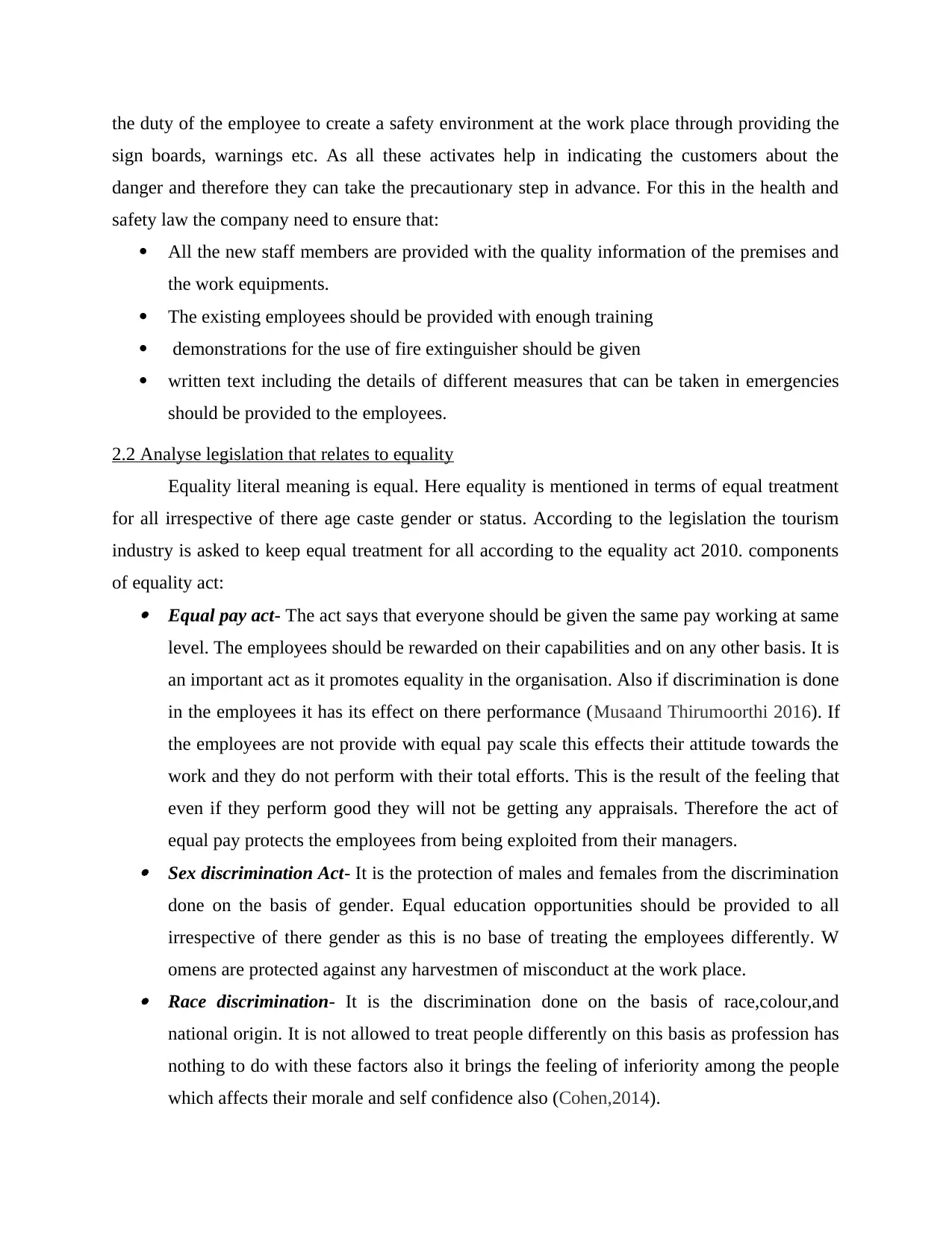
the duty of the employee to create a safety environment at the work place through providing the
sign boards, warnings etc. As all these activates help in indicating the customers about the
danger and therefore they can take the precautionary step in advance. For this in the health and
safety law the company need to ensure that:
All the new staff members are provided with the quality information of the premises and
the work equipments.
The existing employees should be provided with enough training
demonstrations for the use of fire extinguisher should be given
written text including the details of different measures that can be taken in emergencies
should be provided to the employees.
2.2 Analyse legislation that relates to equality
Equality literal meaning is equal. Here equality is mentioned in terms of equal treatment
for all irrespective of there age caste gender or status. According to the legislation the tourism
industry is asked to keep equal treatment for all according to the equality act 2010. components
of equality act: Equal pay act- The act says that everyone should be given the same pay working at same
level. The employees should be rewarded on their capabilities and on any other basis. It is
an important act as it promotes equality in the organisation. Also if discrimination is done
in the employees it has its effect on there performance (Musaand Thirumoorthi 2016). If
the employees are not provide with equal pay scale this effects their attitude towards the
work and they do not perform with their total efforts. This is the result of the feeling that
even if they perform good they will not be getting any appraisals. Therefore the act of
equal pay protects the employees from being exploited from their managers. Sex discrimination Act- It is the protection of males and females from the discrimination
done on the basis of gender. Equal education opportunities should be provided to all
irrespective of there gender as this is no base of treating the employees differently. W
omens are protected against any harvestmen of misconduct at the work place. Race discrimination- It is the discrimination done on the basis of race,colour,and
national origin. It is not allowed to treat people differently on this basis as profession has
nothing to do with these factors also it brings the feeling of inferiority among the people
which affects their morale and self confidence also (Cohen,2014).
sign boards, warnings etc. As all these activates help in indicating the customers about the
danger and therefore they can take the precautionary step in advance. For this in the health and
safety law the company need to ensure that:
All the new staff members are provided with the quality information of the premises and
the work equipments.
The existing employees should be provided with enough training
demonstrations for the use of fire extinguisher should be given
written text including the details of different measures that can be taken in emergencies
should be provided to the employees.
2.2 Analyse legislation that relates to equality
Equality literal meaning is equal. Here equality is mentioned in terms of equal treatment
for all irrespective of there age caste gender or status. According to the legislation the tourism
industry is asked to keep equal treatment for all according to the equality act 2010. components
of equality act: Equal pay act- The act says that everyone should be given the same pay working at same
level. The employees should be rewarded on their capabilities and on any other basis. It is
an important act as it promotes equality in the organisation. Also if discrimination is done
in the employees it has its effect on there performance (Musaand Thirumoorthi 2016). If
the employees are not provide with equal pay scale this effects their attitude towards the
work and they do not perform with their total efforts. This is the result of the feeling that
even if they perform good they will not be getting any appraisals. Therefore the act of
equal pay protects the employees from being exploited from their managers. Sex discrimination Act- It is the protection of males and females from the discrimination
done on the basis of gender. Equal education opportunities should be provided to all
irrespective of there gender as this is no base of treating the employees differently. W
omens are protected against any harvestmen of misconduct at the work place. Race discrimination- It is the discrimination done on the basis of race,colour,and
national origin. It is not allowed to treat people differently on this basis as profession has
nothing to do with these factors also it brings the feeling of inferiority among the people
which affects their morale and self confidence also (Cohen,2014).
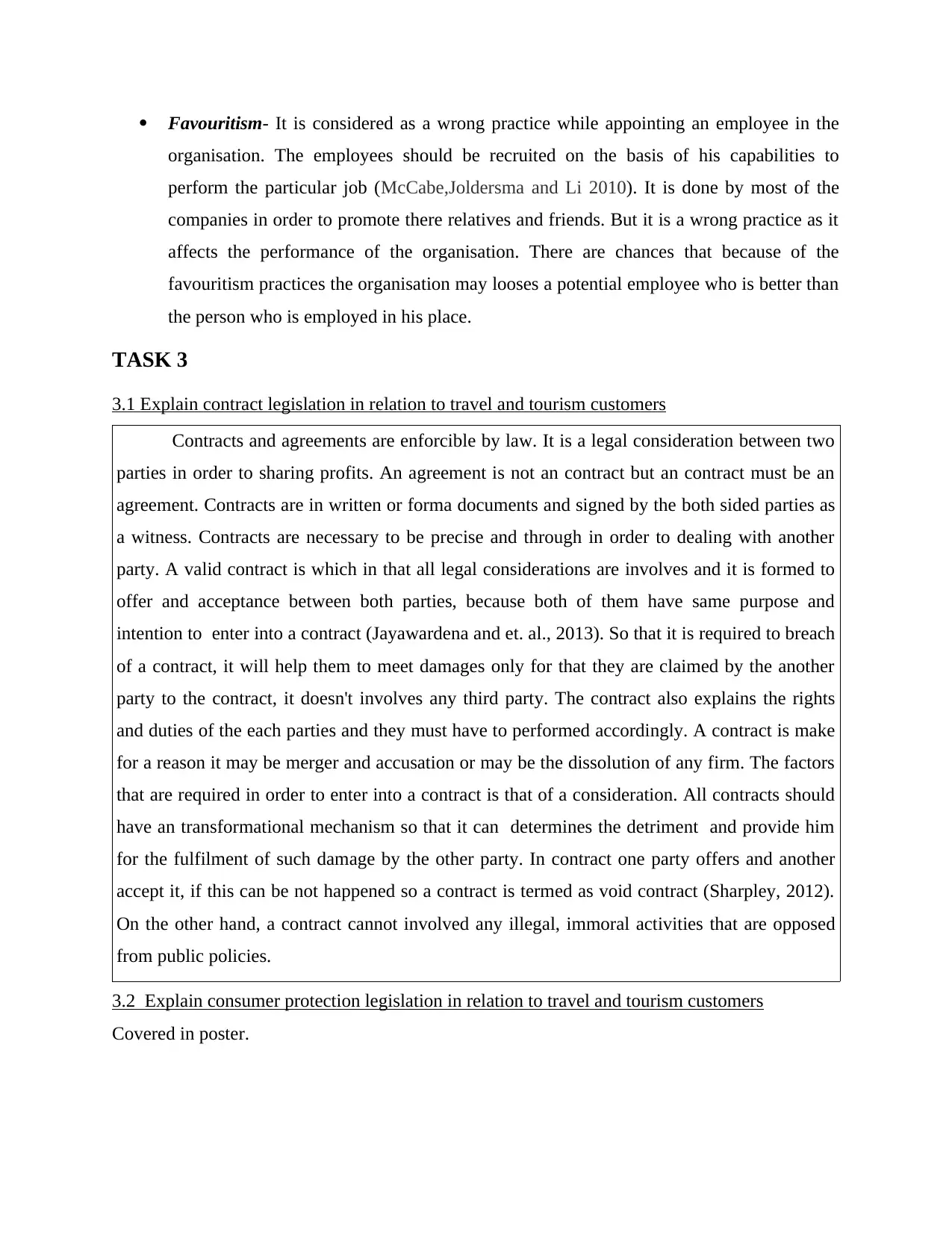
Favouritism- It is considered as a wrong practice while appointing an employee in the
organisation. The employees should be recruited on the basis of his capabilities to
perform the particular job (McCabe,Joldersma and Li 2010). It is done by most of the
companies in order to promote there relatives and friends. But it is a wrong practice as it
affects the performance of the organisation. There are chances that because of the
favouritism practices the organisation may looses a potential employee who is better than
the person who is employed in his place.
TASK 3
3.1 Explain contract legislation in relation to travel and tourism customers
Contracts and agreements are enforcible by law. It is a legal consideration between two
parties in order to sharing profits. An agreement is not an contract but an contract must be an
agreement. Contracts are in written or forma documents and signed by the both sided parties as
a witness. Contracts are necessary to be precise and through in order to dealing with another
party. A valid contract is which in that all legal considerations are involves and it is formed to
offer and acceptance between both parties, because both of them have same purpose and
intention to enter into a contract (Jayawardena and et. al., 2013). So that it is required to breach
of a contract, it will help them to meet damages only for that they are claimed by the another
party to the contract, it doesn't involves any third party. The contract also explains the rights
and duties of the each parties and they must have to performed accordingly. A contract is make
for a reason it may be merger and accusation or may be the dissolution of any firm. The factors
that are required in order to enter into a contract is that of a consideration. All contracts should
have an transformational mechanism so that it can determines the detriment and provide him
for the fulfilment of such damage by the other party. In contract one party offers and another
accept it, if this can be not happened so a contract is termed as void contract (Sharpley, 2012).
On the other hand, a contract cannot involved any illegal, immoral activities that are opposed
from public policies.
3.2 Explain consumer protection legislation in relation to travel and tourism customers
Covered in poster.
organisation. The employees should be recruited on the basis of his capabilities to
perform the particular job (McCabe,Joldersma and Li 2010). It is done by most of the
companies in order to promote there relatives and friends. But it is a wrong practice as it
affects the performance of the organisation. There are chances that because of the
favouritism practices the organisation may looses a potential employee who is better than
the person who is employed in his place.
TASK 3
3.1 Explain contract legislation in relation to travel and tourism customers
Contracts and agreements are enforcible by law. It is a legal consideration between two
parties in order to sharing profits. An agreement is not an contract but an contract must be an
agreement. Contracts are in written or forma documents and signed by the both sided parties as
a witness. Contracts are necessary to be precise and through in order to dealing with another
party. A valid contract is which in that all legal considerations are involves and it is formed to
offer and acceptance between both parties, because both of them have same purpose and
intention to enter into a contract (Jayawardena and et. al., 2013). So that it is required to breach
of a contract, it will help them to meet damages only for that they are claimed by the another
party to the contract, it doesn't involves any third party. The contract also explains the rights
and duties of the each parties and they must have to performed accordingly. A contract is make
for a reason it may be merger and accusation or may be the dissolution of any firm. The factors
that are required in order to enter into a contract is that of a consideration. All contracts should
have an transformational mechanism so that it can determines the detriment and provide him
for the fulfilment of such damage by the other party. In contract one party offers and another
accept it, if this can be not happened so a contract is termed as void contract (Sharpley, 2012).
On the other hand, a contract cannot involved any illegal, immoral activities that are opposed
from public policies.
3.2 Explain consumer protection legislation in relation to travel and tourism customers
Covered in poster.
⊘ This is a preview!⊘
Do you want full access?
Subscribe today to unlock all pages.

Trusted by 1+ million students worldwide
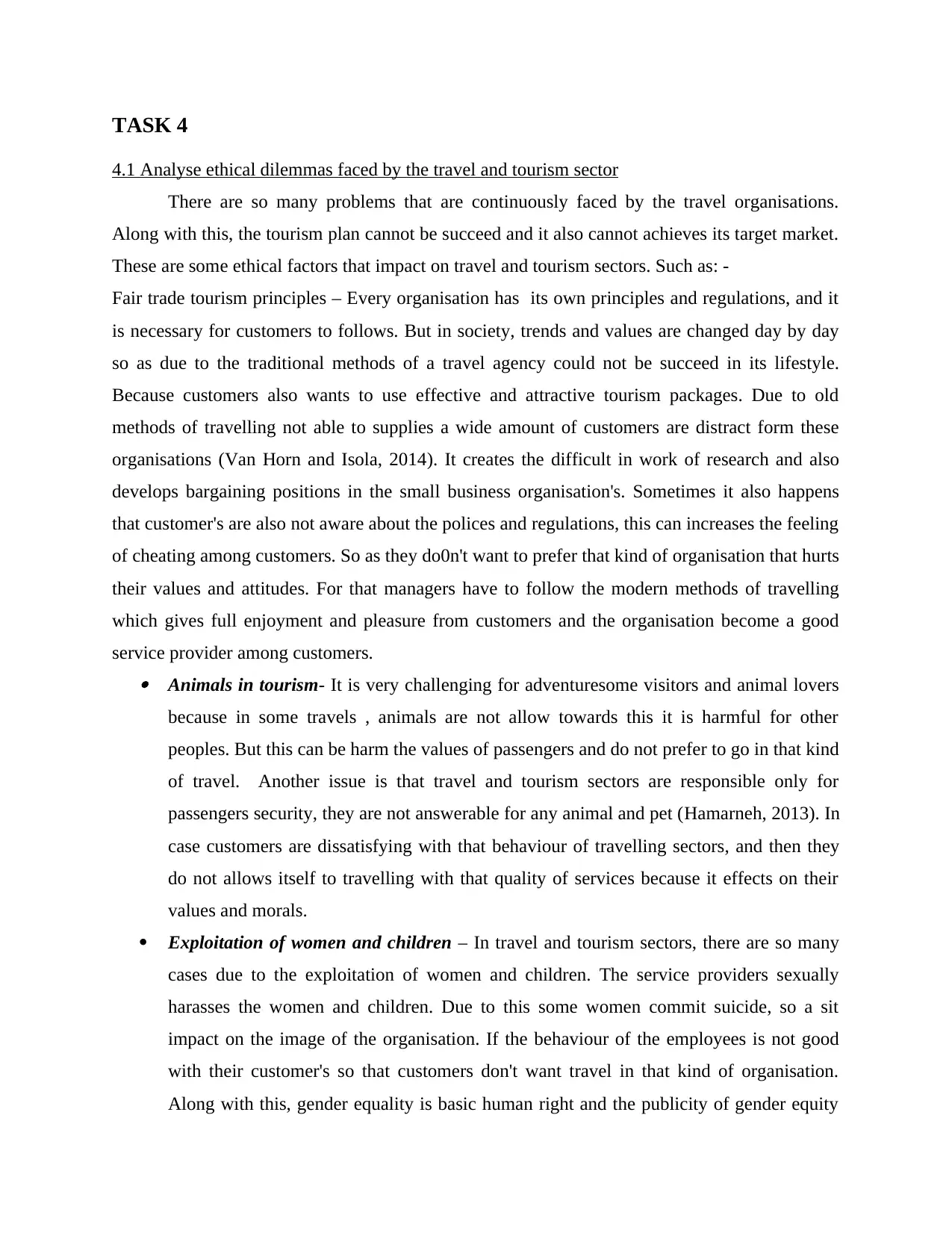
TASK 4
4.1 Analyse ethical dilemmas faced by the travel and tourism sector
There are so many problems that are continuously faced by the travel organisations.
Along with this, the tourism plan cannot be succeed and it also cannot achieves its target market.
These are some ethical factors that impact on travel and tourism sectors. Such as: -
Fair trade tourism principles – Every organisation has its own principles and regulations, and it
is necessary for customers to follows. But in society, trends and values are changed day by day
so as due to the traditional methods of a travel agency could not be succeed in its lifestyle.
Because customers also wants to use effective and attractive tourism packages. Due to old
methods of travelling not able to supplies a wide amount of customers are distract form these
organisations (Van Horn and Isola, 2014). It creates the difficult in work of research and also
develops bargaining positions in the small business organisation's. Sometimes it also happens
that customer's are also not aware about the polices and regulations, this can increases the feeling
of cheating among customers. So as they do0n't want to prefer that kind of organisation that hurts
their values and attitudes. For that managers have to follow the modern methods of travelling
which gives full enjoyment and pleasure from customers and the organisation become a good
service provider among customers. Animals in tourism- It is very challenging for adventuresome visitors and animal lovers
because in some travels , animals are not allow towards this it is harmful for other
peoples. But this can be harm the values of passengers and do not prefer to go in that kind
of travel. Another issue is that travel and tourism sectors are responsible only for
passengers security, they are not answerable for any animal and pet (Hamarneh, 2013). In
case customers are dissatisfying with that behaviour of travelling sectors, and then they
do not allows itself to travelling with that quality of services because it effects on their
values and morals.
Exploitation of women and children – In travel and tourism sectors, there are so many
cases due to the exploitation of women and children. The service providers sexually
harasses the women and children. Due to this some women commit suicide, so a sit
impact on the image of the organisation. If the behaviour of the employees is not good
with their customer's so that customers don't want travel in that kind of organisation.
Along with this, gender equality is basic human right and the publicity of gender equity
4.1 Analyse ethical dilemmas faced by the travel and tourism sector
There are so many problems that are continuously faced by the travel organisations.
Along with this, the tourism plan cannot be succeed and it also cannot achieves its target market.
These are some ethical factors that impact on travel and tourism sectors. Such as: -
Fair trade tourism principles – Every organisation has its own principles and regulations, and it
is necessary for customers to follows. But in society, trends and values are changed day by day
so as due to the traditional methods of a travel agency could not be succeed in its lifestyle.
Because customers also wants to use effective and attractive tourism packages. Due to old
methods of travelling not able to supplies a wide amount of customers are distract form these
organisations (Van Horn and Isola, 2014). It creates the difficult in work of research and also
develops bargaining positions in the small business organisation's. Sometimes it also happens
that customer's are also not aware about the polices and regulations, this can increases the feeling
of cheating among customers. So as they do0n't want to prefer that kind of organisation that hurts
their values and attitudes. For that managers have to follow the modern methods of travelling
which gives full enjoyment and pleasure from customers and the organisation become a good
service provider among customers. Animals in tourism- It is very challenging for adventuresome visitors and animal lovers
because in some travels , animals are not allow towards this it is harmful for other
peoples. But this can be harm the values of passengers and do not prefer to go in that kind
of travel. Another issue is that travel and tourism sectors are responsible only for
passengers security, they are not answerable for any animal and pet (Hamarneh, 2013). In
case customers are dissatisfying with that behaviour of travelling sectors, and then they
do not allows itself to travelling with that quality of services because it effects on their
values and morals.
Exploitation of women and children – In travel and tourism sectors, there are so many
cases due to the exploitation of women and children. The service providers sexually
harasses the women and children. Due to this some women commit suicide, so a sit
impact on the image of the organisation. If the behaviour of the employees is not good
with their customer's so that customers don't want travel in that kind of organisation.
Along with this, gender equality is basic human right and the publicity of gender equity
Paraphrase This Document
Need a fresh take? Get an instant paraphrase of this document with our AI Paraphraser
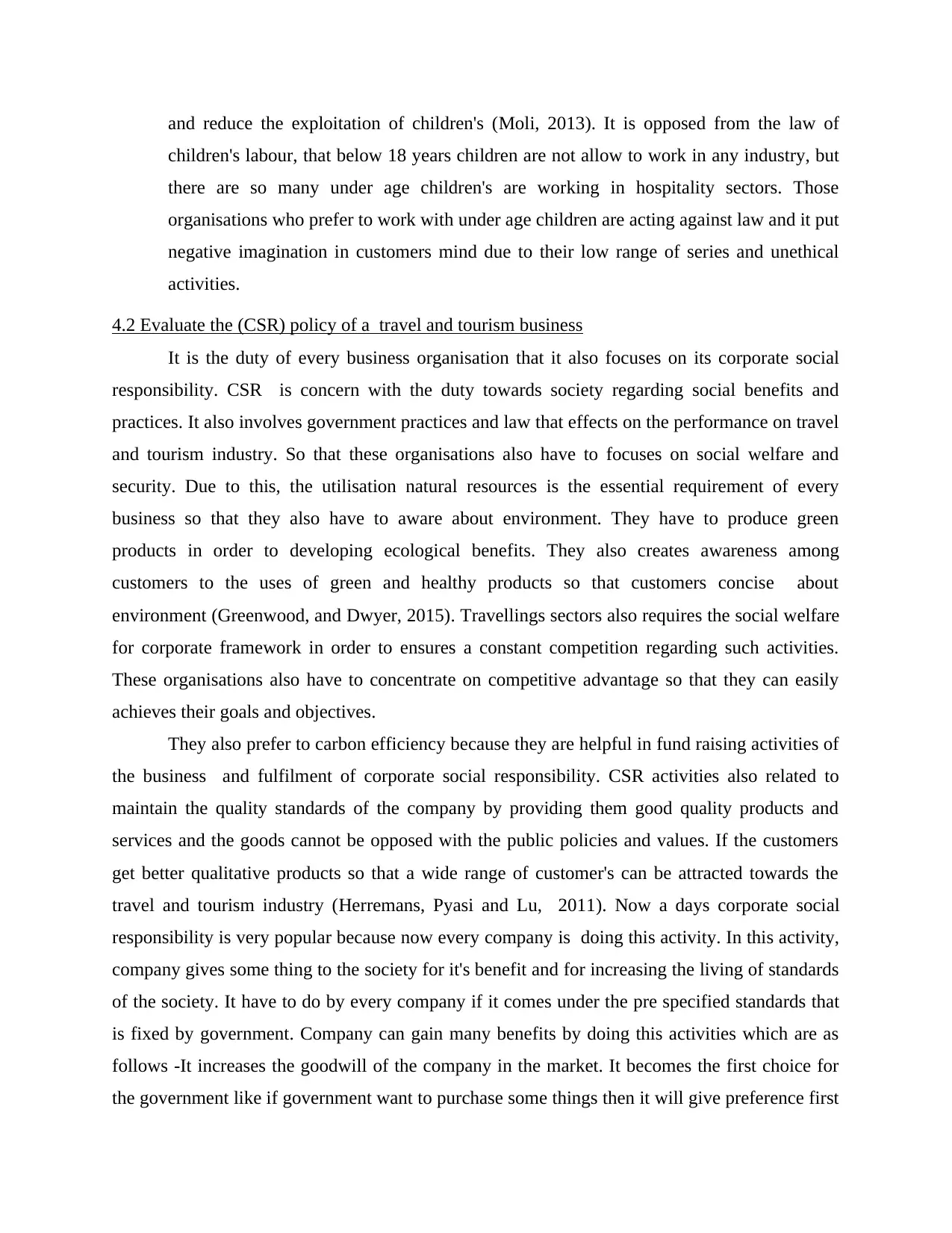
and reduce the exploitation of children's (Moli, 2013). It is opposed from the law of
children's labour, that below 18 years children are not allow to work in any industry, but
there are so many under age children's are working in hospitality sectors. Those
organisations who prefer to work with under age children are acting against law and it put
negative imagination in customers mind due to their low range of series and unethical
activities.
4.2 Evaluate the (CSR) policy of a travel and tourism business
It is the duty of every business organisation that it also focuses on its corporate social
responsibility. CSR is concern with the duty towards society regarding social benefits and
practices. It also involves government practices and law that effects on the performance on travel
and tourism industry. So that these organisations also have to focuses on social welfare and
security. Due to this, the utilisation natural resources is the essential requirement of every
business so that they also have to aware about environment. They have to produce green
products in order to developing ecological benefits. They also creates awareness among
customers to the uses of green and healthy products so that customers concise about
environment (Greenwood, and Dwyer, 2015). Travellings sectors also requires the social welfare
for corporate framework in order to ensures a constant competition regarding such activities.
These organisations also have to concentrate on competitive advantage so that they can easily
achieves their goals and objectives.
They also prefer to carbon efficiency because they are helpful in fund raising activities of
the business and fulfilment of corporate social responsibility. CSR activities also related to
maintain the quality standards of the company by providing them good quality products and
services and the goods cannot be opposed with the public policies and values. If the customers
get better qualitative products so that a wide range of customer's can be attracted towards the
travel and tourism industry (Herremans, Pyasi and Lu, 2011). Now a days corporate social
responsibility is very popular because now every company is doing this activity. In this activity,
company gives some thing to the society for it's benefit and for increasing the living of standards
of the society. It have to do by every company if it comes under the pre specified standards that
is fixed by government. Company can gain many benefits by doing this activities which are as
follows -It increases the goodwill of the company in the market. It becomes the first choice for
the government like if government want to purchase some things then it will give preference first
children's labour, that below 18 years children are not allow to work in any industry, but
there are so many under age children's are working in hospitality sectors. Those
organisations who prefer to work with under age children are acting against law and it put
negative imagination in customers mind due to their low range of series and unethical
activities.
4.2 Evaluate the (CSR) policy of a travel and tourism business
It is the duty of every business organisation that it also focuses on its corporate social
responsibility. CSR is concern with the duty towards society regarding social benefits and
practices. It also involves government practices and law that effects on the performance on travel
and tourism industry. So that these organisations also have to focuses on social welfare and
security. Due to this, the utilisation natural resources is the essential requirement of every
business so that they also have to aware about environment. They have to produce green
products in order to developing ecological benefits. They also creates awareness among
customers to the uses of green and healthy products so that customers concise about
environment (Greenwood, and Dwyer, 2015). Travellings sectors also requires the social welfare
for corporate framework in order to ensures a constant competition regarding such activities.
These organisations also have to concentrate on competitive advantage so that they can easily
achieves their goals and objectives.
They also prefer to carbon efficiency because they are helpful in fund raising activities of
the business and fulfilment of corporate social responsibility. CSR activities also related to
maintain the quality standards of the company by providing them good quality products and
services and the goods cannot be opposed with the public policies and values. If the customers
get better qualitative products so that a wide range of customer's can be attracted towards the
travel and tourism industry (Herremans, Pyasi and Lu, 2011). Now a days corporate social
responsibility is very popular because now every company is doing this activity. In this activity,
company gives some thing to the society for it's benefit and for increasing the living of standards
of the society. It have to do by every company if it comes under the pre specified standards that
is fixed by government. Company can gain many benefits by doing this activities which are as
follows -It increases the goodwill of the company in the market. It becomes the first choice for
the government like if government want to purchase some things then it will give preference first
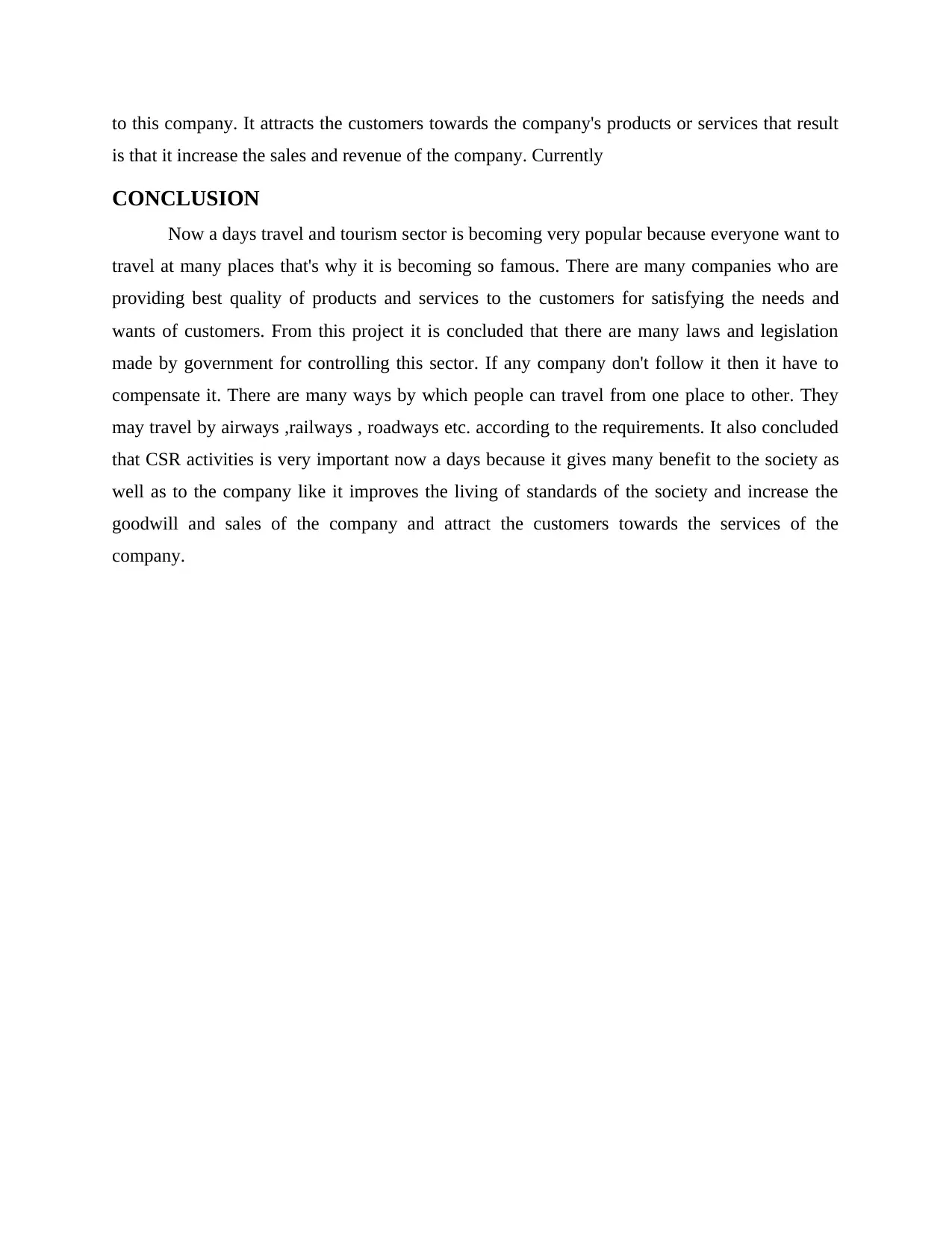
to this company. It attracts the customers towards the company's products or services that result
is that it increase the sales and revenue of the company. Currently
CONCLUSION
Now a days travel and tourism sector is becoming very popular because everyone want to
travel at many places that's why it is becoming so famous. There are many companies who are
providing best quality of products and services to the customers for satisfying the needs and
wants of customers. From this project it is concluded that there are many laws and legislation
made by government for controlling this sector. If any company don't follow it then it have to
compensate it. There are many ways by which people can travel from one place to other. They
may travel by airways ,railways , roadways etc. according to the requirements. It also concluded
that CSR activities is very important now a days because it gives many benefit to the society as
well as to the company like it improves the living of standards of the society and increase the
goodwill and sales of the company and attract the customers towards the services of the
company.
is that it increase the sales and revenue of the company. Currently
CONCLUSION
Now a days travel and tourism sector is becoming very popular because everyone want to
travel at many places that's why it is becoming so famous. There are many companies who are
providing best quality of products and services to the customers for satisfying the needs and
wants of customers. From this project it is concluded that there are many laws and legislation
made by government for controlling this sector. If any company don't follow it then it have to
compensate it. There are many ways by which people can travel from one place to other. They
may travel by airways ,railways , roadways etc. according to the requirements. It also concluded
that CSR activities is very important now a days because it gives many benefit to the society as
well as to the company like it improves the living of standards of the society and increase the
goodwill and sales of the company and attract the customers towards the services of the
company.
⊘ This is a preview!⊘
Do you want full access?
Subscribe today to unlock all pages.

Trusted by 1+ million students worldwide
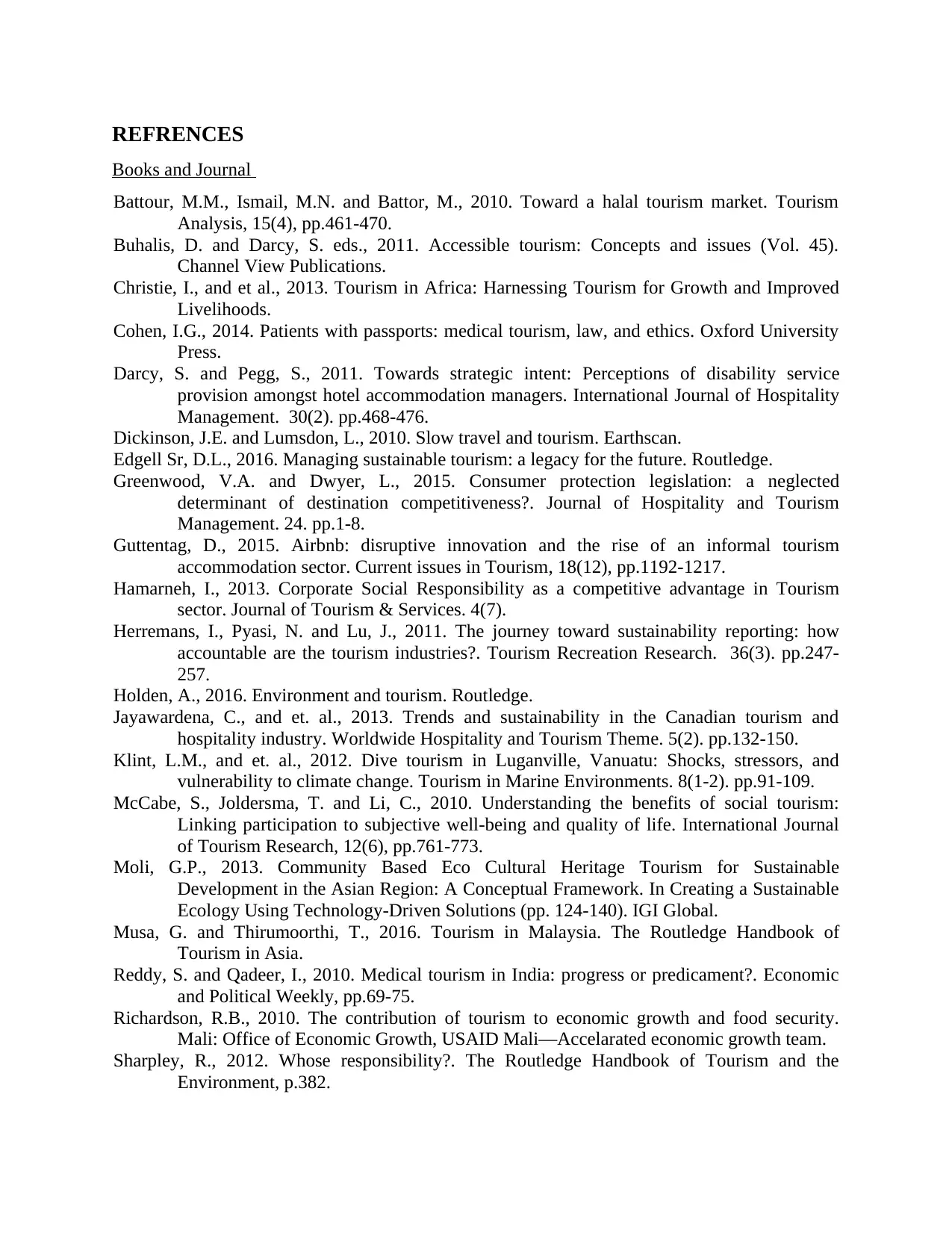
REFRENCES
Books and Journal
Battour, M.M., Ismail, M.N. and Battor, M., 2010. Toward a halal tourism market. Tourism
Analysis, 15(4), pp.461-470.
Buhalis, D. and Darcy, S. eds., 2011. Accessible tourism: Concepts and issues (Vol. 45).
Channel View Publications.
Christie, I., and et al., 2013. Tourism in Africa: Harnessing Tourism for Growth and Improved
Livelihoods.
Cohen, I.G., 2014. Patients with passports: medical tourism, law, and ethics. Oxford University
Press.
Darcy, S. and Pegg, S., 2011. Towards strategic intent: Perceptions of disability service
provision amongst hotel accommodation managers. International Journal of Hospitality
Management. 30(2). pp.468-476.
Dickinson, J.E. and Lumsdon, L., 2010. Slow travel and tourism. Earthscan.
Edgell Sr, D.L., 2016. Managing sustainable tourism: a legacy for the future. Routledge.
Greenwood, V.A. and Dwyer, L., 2015. Consumer protection legislation: a neglected
determinant of destination competitiveness?. Journal of Hospitality and Tourism
Management. 24. pp.1-8.
Guttentag, D., 2015. Airbnb: disruptive innovation and the rise of an informal tourism
accommodation sector. Current issues in Tourism, 18(12), pp.1192-1217.
Hamarneh, I., 2013. Corporate Social Responsibility as a competitive advantage in Tourism
sector. Journal of Tourism & Services. 4(7).
Herremans, I., Pyasi, N. and Lu, J., 2011. The journey toward sustainability reporting: how
accountable are the tourism industries?. Tourism Recreation Research. 36(3). pp.247-
257.
Holden, A., 2016. Environment and tourism. Routledge.
Jayawardena, C., and et. al., 2013. Trends and sustainability in the Canadian tourism and
hospitality industry. Worldwide Hospitality and Tourism Theme. 5(2). pp.132-150.
Klint, L.M., and et. al., 2012. Dive tourism in Luganville, Vanuatu: Shocks, stressors, and
vulnerability to climate change. Tourism in Marine Environments. 8(1-2). pp.91-109.
McCabe, S., Joldersma, T. and Li, C., 2010. Understanding the benefits of social tourism:
Linking participation to subjective well‐being and quality of life. International Journal
of Tourism Research, 12(6), pp.761-773.
Moli, G.P., 2013. Community Based Eco Cultural Heritage Tourism for Sustainable
Development in the Asian Region: A Conceptual Framework. In Creating a Sustainable
Ecology Using Technology-Driven Solutions (pp. 124-140). IGI Global.
Musa, G. and Thirumoorthi, T., 2016. Tourism in Malaysia. The Routledge Handbook of
Tourism in Asia.
Reddy, S. and Qadeer, I., 2010. Medical tourism in India: progress or predicament?. Economic
and Political Weekly, pp.69-75.
Richardson, R.B., 2010. The contribution of tourism to economic growth and food security.
Mali: Office of Economic Growth, USAID Mali—Accelarated economic growth team.
Sharpley, R., 2012. Whose responsibility?. The Routledge Handbook of Tourism and the
Environment, p.382.
Books and Journal
Battour, M.M., Ismail, M.N. and Battor, M., 2010. Toward a halal tourism market. Tourism
Analysis, 15(4), pp.461-470.
Buhalis, D. and Darcy, S. eds., 2011. Accessible tourism: Concepts and issues (Vol. 45).
Channel View Publications.
Christie, I., and et al., 2013. Tourism in Africa: Harnessing Tourism for Growth and Improved
Livelihoods.
Cohen, I.G., 2014. Patients with passports: medical tourism, law, and ethics. Oxford University
Press.
Darcy, S. and Pegg, S., 2011. Towards strategic intent: Perceptions of disability service
provision amongst hotel accommodation managers. International Journal of Hospitality
Management. 30(2). pp.468-476.
Dickinson, J.E. and Lumsdon, L., 2010. Slow travel and tourism. Earthscan.
Edgell Sr, D.L., 2016. Managing sustainable tourism: a legacy for the future. Routledge.
Greenwood, V.A. and Dwyer, L., 2015. Consumer protection legislation: a neglected
determinant of destination competitiveness?. Journal of Hospitality and Tourism
Management. 24. pp.1-8.
Guttentag, D., 2015. Airbnb: disruptive innovation and the rise of an informal tourism
accommodation sector. Current issues in Tourism, 18(12), pp.1192-1217.
Hamarneh, I., 2013. Corporate Social Responsibility as a competitive advantage in Tourism
sector. Journal of Tourism & Services. 4(7).
Herremans, I., Pyasi, N. and Lu, J., 2011. The journey toward sustainability reporting: how
accountable are the tourism industries?. Tourism Recreation Research. 36(3). pp.247-
257.
Holden, A., 2016. Environment and tourism. Routledge.
Jayawardena, C., and et. al., 2013. Trends and sustainability in the Canadian tourism and
hospitality industry. Worldwide Hospitality and Tourism Theme. 5(2). pp.132-150.
Klint, L.M., and et. al., 2012. Dive tourism in Luganville, Vanuatu: Shocks, stressors, and
vulnerability to climate change. Tourism in Marine Environments. 8(1-2). pp.91-109.
McCabe, S., Joldersma, T. and Li, C., 2010. Understanding the benefits of social tourism:
Linking participation to subjective well‐being and quality of life. International Journal
of Tourism Research, 12(6), pp.761-773.
Moli, G.P., 2013. Community Based Eco Cultural Heritage Tourism for Sustainable
Development in the Asian Region: A Conceptual Framework. In Creating a Sustainable
Ecology Using Technology-Driven Solutions (pp. 124-140). IGI Global.
Musa, G. and Thirumoorthi, T., 2016. Tourism in Malaysia. The Routledge Handbook of
Tourism in Asia.
Reddy, S. and Qadeer, I., 2010. Medical tourism in India: progress or predicament?. Economic
and Political Weekly, pp.69-75.
Richardson, R.B., 2010. The contribution of tourism to economic growth and food security.
Mali: Office of Economic Growth, USAID Mali—Accelarated economic growth team.
Sharpley, R., 2012. Whose responsibility?. The Routledge Handbook of Tourism and the
Environment, p.382.
Paraphrase This Document
Need a fresh take? Get an instant paraphrase of this document with our AI Paraphraser
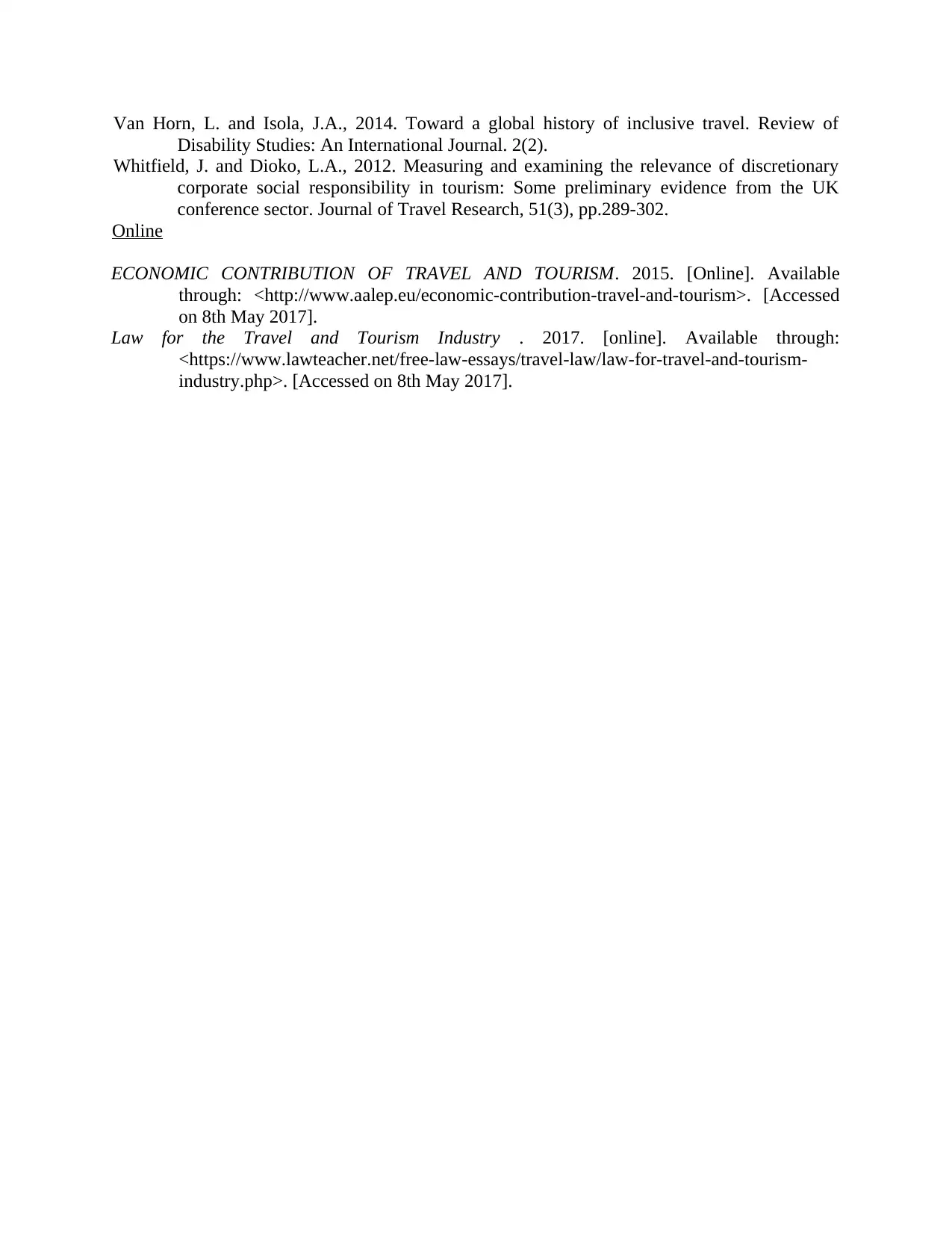
Van Horn, L. and Isola, J.A., 2014. Toward a global history of inclusive travel. Review of
Disability Studies: An International Journal. 2(2).
Whitfield, J. and Dioko, L.A., 2012. Measuring and examining the relevance of discretionary
corporate social responsibility in tourism: Some preliminary evidence from the UK
conference sector. Journal of Travel Research, 51(3), pp.289-302.
Online
ECONOMIC CONTRIBUTION OF TRAVEL AND TOURISM. 2015. [Online]. Available
through: <http://www.aalep.eu/economic-contribution-travel-and-tourism>. [Accessed
on 8th May 2017].
Law for the Travel and Tourism Industry . 2017. [online]. Available through:
<https://www.lawteacher.net/free-law-essays/travel-law/law-for-travel-and-tourism-
industry.php>. [Accessed on 8th May 2017].
Disability Studies: An International Journal. 2(2).
Whitfield, J. and Dioko, L.A., 2012. Measuring and examining the relevance of discretionary
corporate social responsibility in tourism: Some preliminary evidence from the UK
conference sector. Journal of Travel Research, 51(3), pp.289-302.
Online
ECONOMIC CONTRIBUTION OF TRAVEL AND TOURISM. 2015. [Online]. Available
through: <http://www.aalep.eu/economic-contribution-travel-and-tourism>. [Accessed
on 8th May 2017].
Law for the Travel and Tourism Industry . 2017. [online]. Available through:
<https://www.lawteacher.net/free-law-essays/travel-law/law-for-travel-and-tourism-
industry.php>. [Accessed on 8th May 2017].

⊘ This is a preview!⊘
Do you want full access?
Subscribe today to unlock all pages.

Trusted by 1+ million students worldwide
1 out of 13
Related Documents
Your All-in-One AI-Powered Toolkit for Academic Success.
+13062052269
info@desklib.com
Available 24*7 on WhatsApp / Email
![[object Object]](/_next/static/media/star-bottom.7253800d.svg)
Unlock your academic potential
Copyright © 2020–2026 A2Z Services. All Rights Reserved. Developed and managed by ZUCOL.




